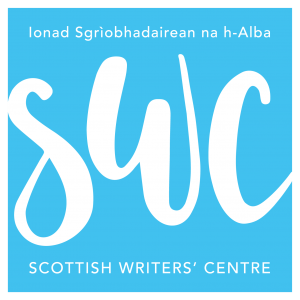
‘What’s the secret to writing?’ Liz asks. ‘Just sit down at a desk, tie yourself to a chair, tie the chair to the desk, don’t move, and keep going – even if you’re stuck.’
This tip, delivered with a laugh, blends humour and heart, like Liz’s poetry, her drama, and the insights she offers us during her ‘In Process’ master class. ‘I want this to develop into a discussion as fast as possible,’ she tells us, perched comfortably on the front of the desk she could be sitting behind, and this is something she makes easy, mixing her poems with personal anecdotes, as well as questions to the audience.
As she does, Liz immediately strikes you as down to earth, though she needn’t be. One of Scotland’s most famous and successful poets and playwrights, she is talking to us at the end of her stint as Scots Makar, the national poet-laureate. In her time as Makar, Liz was tasked with responding to various themes of national and international importance, such as the opening of the 2012 session of the Scottish Parliament, and the 2014 Commonwealth Games. She spoke about these honours with a familiar kind of modesty.
‘I enjoyed responding to the requests of various sorts. You don’t know what you’ll get: they might not always be keepers, but sometimes they are’. She shared with us the poem she wrote for the Commonwealth Games on the theme of communication, a reflective, rhapsodic rumination on the different meanings of the word. ‘Communication can mean correspondence, or a connecting channel. It can be a means of importing information, a means of transporting – especially troops or supplies. Commonwealth means friendship, locality, the desire for democracy, equality, freedom, peace – even when wealth is what we do not have in common’.
Liz was pleased with the outcome of this particular request, but being Makar wasn’t always so pleasant or easy. ‘Sometimes you just get stuck,’ she says. ‘I do, anyway’. In her very human and relatable admission, Liz touched on what is perhaps the central theme of writing master classes – should I schedule my writing, and if so, how?’ Liz was quite clear that she could offer no real advice on the matter, and that she was wary of writing advice as a whole, given how idiosyncratic her own methods were. ‘Maybe one should schedule your writing every day, but I don’t. I work in a mad way,’ she tells us with a laugh that lets us know she’s serious. ‘I often work from night until morning.’

Though she was honoured by each request and genuinely enjoyed her time as Makar, she is also looking forward to what the future will bring. She was thrilled, for example, that just last week she had been able to write a poem about a cambric shirt ‘just for the sake of the idea’. Ideas are something Liz is more comfortable talking about passionately, and sees them as immensely important to the work she produces, viewing an interesting idea as something that gives life not only to the poem, but also to the process of producing it as well.
‘Wait for an idea, and even if it’s the merest wee hint of an idea, write it down. In your head it’s marvellous and you don’t want to write it down, but do. If you leave it as a good idea in your head for more than a week it’ll die. A good idea isn’t anything – it’s what you can achieve with it that counts.’
There is, then, throughout the evening, the sense that Liz’s master class isn’t so much a space in which she advocates the best way of doing things, but one in which she shares her own experiences, what did and didn’t work for her personally. There is the sense that she views creativity as an intensely personal experience, and as such she can only advocate colluding with it, following ideas, exploring with them, discovering with them – because even though you might not be able to make them come, you can certainly control how you follow them up. Indeed, for most of her life, ideas have come to Liz when she was supposed to be doing something else: ‘I started writing at Art School when I was supposed to be drawing,’ she tells us. Now she often finds herself drawing when she should be writing.
She has a similar relationship with poetry and plays, and sees them as inherently connected, though each presents its own unique challenges. She brought with her in an impressive sheaf of white paper: a fourth draft of her latest unpublished play, but she admits: ‘I was dying to write something as pure as a poem after a play. There’s definitely a strong relationship between the two, though. I wouldn’t have started writing plays if it wasn’t for reading poetry out loud.’

This talk of different mediums then led onto a discussion of forms, but again, Liz was cautious of prescribing anything: ‘Forms are great for getting the juices flowing, but you’ve got to be doing things because you want to do them, in your own way,’ and it was on this theme she concluded the night.
‘That’s the one bit of advice I’ve got: write what you’re really interested in, not what you think you should be interested in. If you want to write, a biro’s cheap. If you want to write, clear the deck, and make space for it. You’ve just got to muddle on the way you’ve kept muddlin’ on, except at my age you can think: “well, it hasn’t gone yet, so it might not go now.” You don’t necessarily get better when you get older – all you want to do is to keep going’.
words by Scott Crawford Morrison, images by Yutsil Hoyo Diaz Martinez



